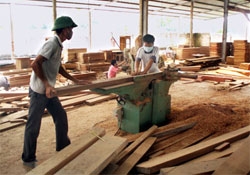Wood processing plants urged to join associations
 |
| illustration photo |
Not the lack of export orders but continual rising input costs has proven a headache to local wooden product manufacturers, said Ho Chi Minh City Handicraft and Wood Industry Association (HAWA) chairman Nguyen Chien Thang.
Thang said that profit margins of wooden furniture manufacturers would see a decline unless they embraced technology innovation solutions to boost efficiency.
“Manpower becomes increasingly scarce and costly, meanwhile input costs are on the rise. In this context, businesses would grapple with difficulties unless they join alliances,” he said.
Supportive of his idea, director of southern Binh Duong-based Minh Phat 2 Company Limited Dien Quang Hiep, a HAWA executive member said the price of rubber woods rose markedly in 2010 after rubber latex eyed a price surge of 50 per cent compared to 2009. That was because rubber farms delayed logging down ‘old’ rubber trees for further latex extraction to make use of the price hike. This led to rubber wood scarcity and drove up the price, he said.
“Besides, the US’s Lacey act, effective from April 1, 2010 and the EU’s FLEGT system, to be effective from January, 2012 require Vietnamese wooden item manufacturers to show a Forest Stewardship Council (FSC) certificate and Certificate of Compliance (COC) for their export shipments. Meanwhile, only 200 out of 600 Vietnamese wooden furniture manufacturers have obtained these two certificates until present,” Hiep unveiled.
In this situation, Vietnamese firms would hardly compete with businesses from other countries in the world marketplace if they did not team up, according to UNIDO’s chief technical advisor Francesco Russo.
HAWA recently signed a cooperative agreement on capacity building for Ho Chi Minh City-based wood processing businesses with the United Nations Industrial Development Organisation (UNIDO) through a small- and- medium- sized enterprises cluster development project.
“It is difficult to control the products’ quality and handle big orders if businesses operate separately. Besides, the image of made-in-Vietnam wooden furniture would easily be ruined if only one business did not abide by related laws,” he said.
In his mind, wooden furniture manufacturers should team up into clusters which bring businesses together on an equal footing and in specific geographical locations.
He pointed out one fact that in Bologne (Italy) firms producing kitchen interior and accessories teamed up and reaped resounding success. He said that UNIDO wanted to replicate this model for small- and- medium- sized wood processing firms in Vietnam.
In fact, Vietnam is now home to three wood processing clusters only: Ho Chi Minh City-Binh Duong, Binh Dinh-Central Highlands and Hanoi-Bac Ninh. Under the signed agreement with UNIDO, in the coming period this organisation will cooperate with HAWA to continue establishing wood processing industrial clusters in southern areas, said Francesco Russo.
HAWA deputy chairman Tran Quoc Manh said besides teaming up, businesses in the industry needed to invest in the latest equipment and technology to boost production and raise quality. In the meantime, they should also ameliorate design capacity to keep up with diversified market requirements and increase sales in the domestic market.
What the stars mean:
★ Poor ★ ★ Promising ★★★ Good ★★★★ Very good ★★★★★ Exceptional
Related Contents
Latest News
More News
- Haiphong gains new growth impetus from strategic planning and integrated infrastructure (February 27, 2026 | 16:40)
- Kurz Vietnam expands Gia Lai factory (February 27, 2026 | 16:37)
- SK Innovation-led consortium wins $2.3 billion LNG project in Nghe An (February 25, 2026 | 07:56)
- THACO opens $70 million manufacturing complex in Danang (February 25, 2026 | 07:54)
- Phu Quoc International Airport expansion approved to meet rising demand (February 24, 2026 | 10:00)
- Bac Giang International Logistics Centre faces land clearance barrier (February 24, 2026 | 08:00)
- Bright prospects abound in European investment (February 19, 2026 | 20:27)
- Internal strengths attest to commitment to progress (February 19, 2026 | 20:13)
- Vietnam, New Zealand seek level-up in ties (February 19, 2026 | 18:06)
- Untapped potential in relations with Indonesia (February 19, 2026 | 17:56)

 Tag:
Tag:




















 Mobile Version
Mobile Version